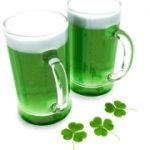
Legend and Celebrations :
Saint Patrick’s day is a religious feast festival of Catholic Christians having its roots in Ireland with the celebrations gaining significance in other countries, particularly America and Britain. Just like St. Valentines Day, St. Patrick’s Day (i.e, 17th March) commemorates the demise of the revered patronized Irish saint St. Patrick. So, what is the legend behind St. Patrick which led to the association of a festival in his name and how is the day celebrated ?
The story goes like this…
 Originally born (in later half of fourth century) to Roman parents in Scotland or Roman England (there are conflicting opinions regarding the place of birth), he was previously known by the name Maewyn Succat. He was given a Romanticized name Patricius leading to him being known as Patrick.
Originally born (in later half of fourth century) to Roman parents in Scotland or Roman England (there are conflicting opinions regarding the place of birth), he was previously known by the name Maewyn Succat. He was given a Romanticized name Patricius leading to him being known as Patrick.
Patrick was originally a pagan ( a non-believer of Christianity ). During his childhood, he was  kidnapped and sold as a slave to the Celtic Druids who then ruled Ireland. It was during that stage of life that his attitude and beliefs towards God started changing. After six years, he escaped from slavery when he dream of God giving him instructions for the same. He was taught priesthood in France. When he became a bishop, he again dream of Irish people calling him and requiring his services.
kidnapped and sold as a slave to the Celtic Druids who then ruled Ireland. It was during that stage of life that his attitude and beliefs towards God started changing. After six years, he escaped from slavery when he dream of God giving him instructions for the same. He was taught priesthood in France. When he became a bishop, he again dream of Irish people calling him and requiring his services.
So, he returned to Ireland with firm belief of converting pagans to Christians. Despite being arrested by the Celtic Druids several times, he always managed to escape and was not deterred. He actively baptized and preached Christianity. He even used diplomacy like gifting people in king lets and gifting lawgivers. For 20 years he had traveled throughout Ireland, establishing monasteries across the country. He also set up schools and churches which would aid him in his conversion.
How is the Patrick’s day celebrated ?
As a part of the celebration, Many Irish people wear a bunch of shamrock on their lapels or caps on St. Patrick’s Day, while children wear tricolored (green, white and orange) badges. Girls traditionally wore green ribbons in their hair (many still do).
children wear tricolored (green, white and orange) badges. Girls traditionally wore green ribbons in their hair (many still do).
 A three-leafed Shamrock clover was used by St. Patrick to represent the trinity, like father, son and holy spirit; also shamrock was considered lucky by Irish people. The shamrock was used by the Irish as a mark of nationalism when the English invaded the Celtics. Thus a shamrock is given lot of reverence in Ireland. Leprechauns or Irish fairy people are also associated with St. Patrick’s festival. In Irish mythology, a leprechaun is a type of elf said to inhabit the island of Ireland.
A three-leafed Shamrock clover was used by St. Patrick to represent the trinity, like father, son and holy spirit; also shamrock was considered lucky by Irish people. The shamrock was used by the Irish as a mark of nationalism when the English invaded the Celtics. Thus a shamrock is given lot of reverence in Ireland. Leprechauns or Irish fairy people are also associated with St. Patrick’s festival. In Irish mythology, a leprechaun is a type of elf said to inhabit the island of Ireland.
In recent times, the St. Patrick’s Day celebrations in Dublin have been extended to a week-long event called St. Patrick’s Festival, encompassing a spectacular fireworks display (Sky-fest), open-air music, street theater and the traditional parade. Over one million people attended the celebrations in 2004.
St. Patrick’s Day is celebrated worldwide by the Irish and those of Irish descent. A major parade takes place in Dublin and in most other Irish towns and villages. The three largest parades of recent years have been held in Dublin, New York and 
 Birmingham England. Parades also take place in other centers, London, Paris, Rome, Moscow, Beijing, Hong Kong, Singapore and throughout the Americas.
Birmingham England. Parades also take place in other centers, London, Paris, Rome, Moscow, Beijing, Hong Kong, Singapore and throughout the Americas.
In the United States, St. Patrick’s Day would not be St. Patrick’s Day unless the Chicago River is dyed green. Also, St. Paddy’s Day has little religious or historical significance. Established in Boston in 1737, it is essentially a time to put on a “Kiss Me I’m Irish” button, and parade drunken through the streets singing a mangled version of “Danny Boy” in celebration of one’s real or imagined Irish ancestry.
Thus in a nutshell, it can be seen that the legends revolving around St Patrick have been inseparably combined with the facts. The day invariably evokes the “I am Irish” sentiments along with patronizing St. Patrick for his services towards Ireland. And together they have helped us know much about the Saint and the spirit behind celebration of the day.

“May your pockets be heavy and your heart be light, may good luck pursue you each morning and night.”
Irish Blessing

